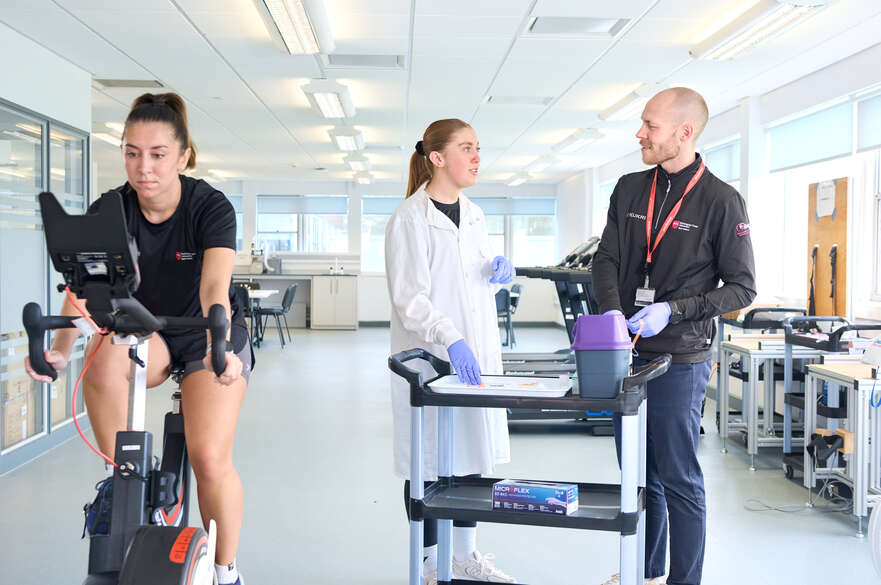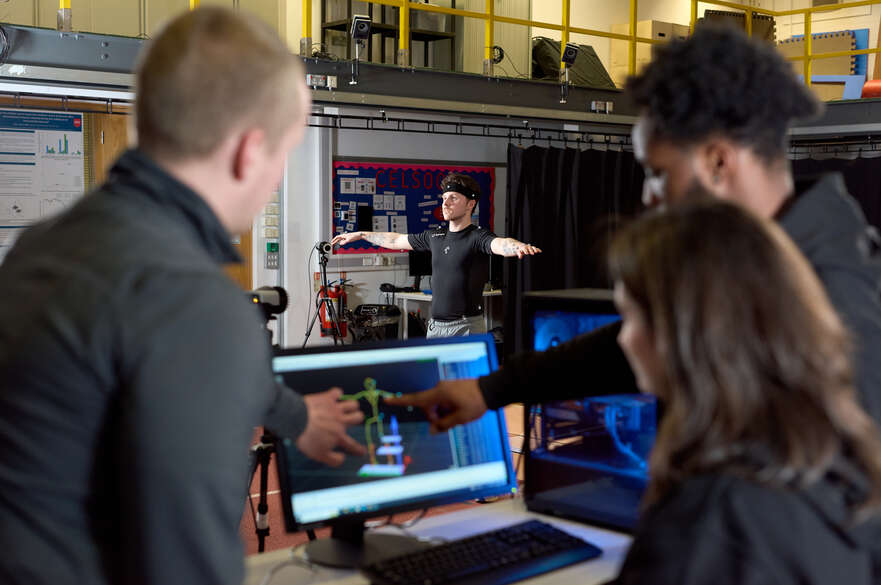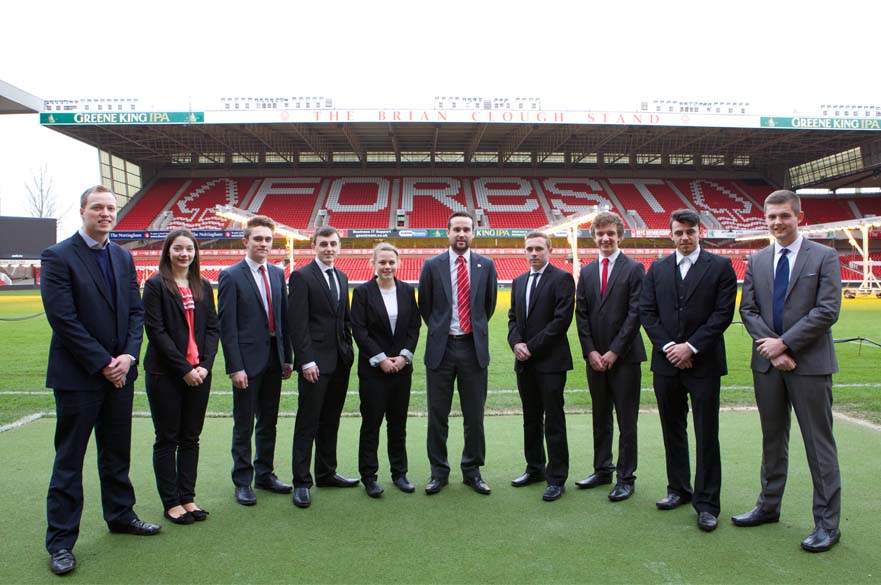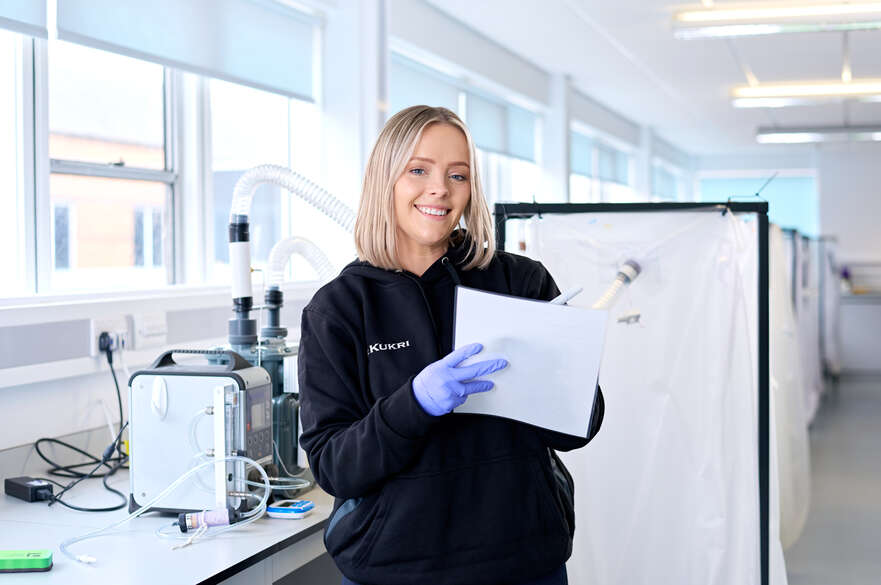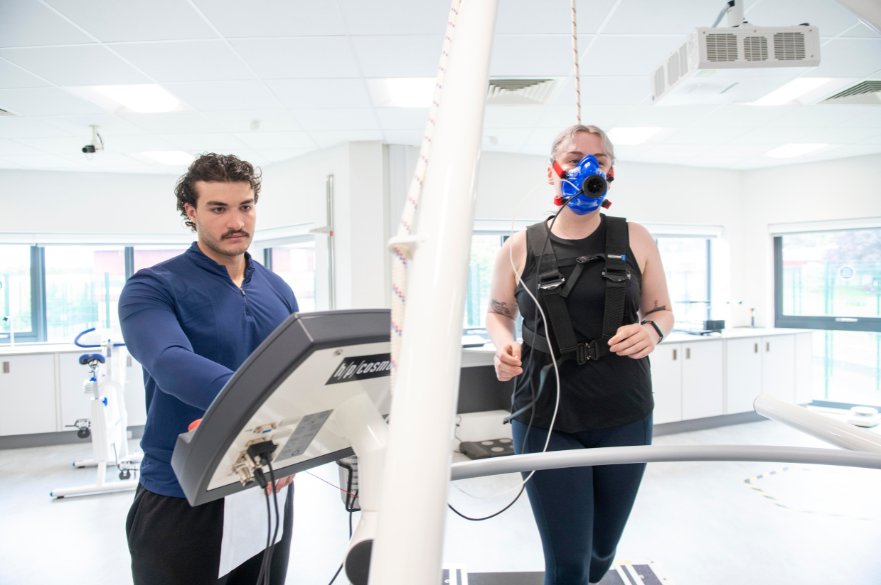This course is in Clearing
Offers from 80 tariff points
About this course
Sport and exercise goes beyond physical fitness: it involves unlocking the full potential of human performance, enhancing mental wellbeing, cultivating teamwork, and contributing to a healthier, more resilient society.
On our BSc (Hons) Sport and Exercise Science degree, you’ll delve into technique, strategy, physiology and more to determine how teams and individuals can maximise their sports performance. Working on live briefs set by our industry partners, you’ll be a driving force for success.
But it doesn’t stop there. A healthy community is a happy community, and by getting involved with our Sport and Wellbeing Academy, you can give local people the tools and confidence to improve their lifestyles – from schoolchildren to adults of all ages and fitness levels.
Sport and exercise science at NTU is about putting theory into practice, and seeing how you can make a difference to people’s lives. If you’re after a degree which gets you working hands-on with sportspeople, drives positive change, and opens doors to the fitness, sporting and wellbeing industries, look no further.
Why this course?
What you’ll study
BSc (Hons) Sport and Exercise Science at NTU isn’t just about science and theory: it’s about action. You’ll apply your learning to real life and real people from the get-go, and complete briefs set by our industry partners. Your projects could involve devising strategies for how athletes operate in different environmental climates; investigating the impact of age on performance in U9 to U15 football players; or examining the techniques of an Olympic sport using motion analysis software.
From Year Two onwards, you’ll benefit from a broad range of optional modules – covering topics from illness and talent development to contemporary issues in sport – which allow you to tailor your degree and home in on your desired career path.
Study highlights include:
- Work on live briefs for big industry players, including the NHS, Sportstest and Nottingham Forest FC.
- Take your learning beyond the classroom, with projects across our local community, visits to major sporting venues, and field trips around the UK.
- Gain crucial work experience on an optional paid or voluntary placement year, working for organisations like local schools, sports clubs or physiotherapists.
- Get familiar with advanced industry-standard sports science facilities, including specialist laboratories and purpose-built sports performance analysis suites.
- Complete an independent sports project of your choice in your final year, reflecting your professional interests and bringing together everything you’ve learnt on your degree.
- Boost your employability further by becoming a certified personal trainer, or by learning a language alongside your sports and exercise science studies on our University Language Programme (ULP).
Here’s a full breakdown of your modules.
Introduction to Sport and Exercise Physiology (20 credit points)
This module provides the foundations of the key human systems (both anatomical and physiological) and their responses and
adaptations to sport and exercise.
Foundations in Sport and Exercise Psychology (20 cp)
Examine the psychological consequences of engaging in sport and exercise, as well as the mental factors that impact on quality
sport and exercise experiences.
Introduction to Human Movement Science (20 cp)
Learn about the theoretical and practical aspects of biomechanics relevant to understanding motion of the human body and the forces generated or experienced by the human body.
Sport, Culture and Society: a Critical Introduction (20 cp)
Explore the importance of the social sciences in the understanding of sport and in the education of every sports professional.
Foundation Nutrition (20 cp)
Learn the essential principles and concepts of nutrition, focusing upon the structure and function of nutrients, the effects of
consumption and the methods for assessing nutritional intake and status.
Developing Academic and Research Skills (20 cp)
Get an overall perspective of the research process in the context of sport, exercise, health and leisure management, and learn the research skills necessary to successfully complete your studies.
Core modules:
Applied Sport and Exercise Physiology (20 cp)
Through theoretical and practical study, you will learn how bouts of physical exercise alter the body’s structures and functions and how these concepts can be applied to training.
Practical Applications in Sport and Exercise Psychology (20 cp)
This module introduces the concept of evidence-based practice and frameworks of assessment, intervention and evaluation to address issues in sport, coaching, and social and exercise psychology.
Analysis of Human Movement Science for Sport (20 cp)
Building on the biomechanical principles studied in Year One, you will develop the skills required to explain measurable human movements and forces using biomechanical theories.
Integrated Applied and Professional Skills (20 cp)
Using enquiry-based learning, you will continue to learn about the research process and gain an understanding and experience of how research is conducted within sports and exercise science.
Sport and Exercise Nutrition (20 cp)
Understand the role nutrition has on an athlete’s performance. You’ll study the physiological and biochemical processes the human body performs to access the nutritional components of the food we eat. Following an evaluation of dietary needs, you’ll be able to design a nutritional plan to optimise training and performance in sport at all levels.
Optional modules - choose one module from:
Clinical Exercise Physiology (20 cp)
Develop your understanding of how disease states affect physiological processes to impede exercise capacity and how exercise training can improve health and wellbeing.
Sociology of Sport, Health and the Body (20 cp)
Develop a critical understanding of the active body in society by connecting fundamental theories and concepts with personal experiences, professional challenges, and popular cultural examples.
Optional year-long work placement. If you are not taking a placement, you will progress directly to your final year in year three.
Core modules:
Sport Project and Dissertation (40 cp)
You will produce an original and independent piece of work in a specialist area of sport and exercise science depending on your focus of study.
Applied Sport Science (20 cp)
Adopt a multidisciplinary approach to sport and exercise science and develop case studies that apply at disciplines of sport and exercise science science.
Optional modules - choose one from:
Strength, Power and Endurance for Sport and Exercise (20 cp)
This module typically focuses on six topics related to applied exercise physiology and strength and conditioning research.
Advanced Topics in Sport and Exercise Psychology (20 cp)
You will become familiar with selected areas such as motivational climate, athletic identity, mental toughness, psychology of injury and morality in sports. The emphasis of this module will be placed on current primary research.
Performance Analysis (20 cp)
Explore a range of performance analysis approaches and methodologies using industry-standard hardware and software. You’ll learn the skills for collating, preparing, and analysing performance data before developing recommendations to maximise performance.
Transforming Sport: Sustainability and Social Justice (20 cp)
Study and challenge the accepted beliefs and practices of those who govern and promote sport. Drawing on a variety of topics, this module presents a case for sport sociology as an agent of positive change in sport.
Choose one from:
Applied Human Movement Science for Sport (20 cp)
This module addresses, in the context of biomechanics, how to improve and / or optimise human performance and to understand how human performance can be affected by or result in dysfunction.
Current Topics in Sport and Exercise Nutrition (20 cp)
This module provides the fundamental knowledge and understanding that underpins the relationship between nutrition and exercise performance.
Challenging Critical Issues in Sport (20 cp)
You'll analyse complex problems such as sports injury, drug use in sports and inequality and develop potential solutions using positive social changes.
Talent Development in Sport (20 cp)
This module will explore a critical view of the role of talent development in sports, focusing on the psychosocial, environmental, and personal factors that can influence the talent development process.
Choose one from:
Performance Skill and Expertise in Sport (20 cp)
This module outlines how human movement and motor programs are initiated, controlled, learned, taught and performed.
Environmental Sports Physiology (20 cp)
This module outlines some physiological adaptations that occur when the human body is exposed to an extreme environment.
Disease, Illness and Injury (20 cp)
Investigate injury management and illnesses that occur in sports and exercise. You'll examine the epidemiology, mechanisms and risk factors and the use of strategies to avoid and lessen the occurrence of sports injuries and illnesses.
We regularly review and update our course content based on student and employer feedback, ensuring that all of our courses remain current and relevant. This may result in changes to module content or module availability in future years.
Don’t just take our word for it, hear from our students themselves
Video Gallery
How you're taught
Our Sport and Exercise Science Department comprises a team of experts with decades of experience between them, ranging from long-time industry professionals to academic researchers. At NTU, our excellent research informs all our teaching – and not only will you be taught by the people behind it, but you’ll be using the very same facilities and equipment they use.
Our BSc Sport and Exercise Science degree course is endorsed by The Chartered Association of Sport and Exercise Sciences (CASES), meaning you can be sure that you’ll receive high-quality teaching which is relevant to the industry.
You’ll learn through a mix of:
- lectures, covering the key theories and most pressing issues in sport and exercise science
- seminars, which are smaller-group sessions perfect for learning key skills and collaborative working
- practical workshops using our extensive range of industry-standard facilities
- external visits to the organisations which set your live briefs.
As the course progresses, you’ll have an increasing amount of time to focus on independent study and research. You’ll still have access to your tutors whenever you need them.
You may choose to take a placement year between Year Two and your final year.
Study abroad opportunities
Get ready to embark on an adventure with our study abroad programs at partner universities or by getting a work placement overseas. Both opportunities will boost your employability, build lifelong friendships, and allow you to experience the world in a whole new way.
How you're assessed
People excel in different ways, and we want everybody to have the best possible chance of success. That’s why we’ve adopted a range of assessment types on our sport and exercise science course, including:
- coursework, including group projects, case studies, dissertation and other assignments
- practical assessments, such as individual and group presentations, laboratory assessments and lab reports
- written exams and multiple-choice tests.
Contact hours
As the course progresses, you’ll have an increasing amount of time to focus on independent study and research. You’ll still have access to your tutors whenever you need them.
You may choose to take a placement year between Year Two and your final year.
Careers and employability
What can you do with a sports science degree? The broad nature and flexibility of our sport and exercise science degree can take you into a huge range of roles across the sports and health sector, spanning from working with professional athletes, to specialist medical occupations, to local health and lifestyle schemes.
Here at NTU, we’re committed to preparing our students for their careers after graduation. That’s why this course incorporates built-in work-like experience, and every student is supported by our award-winning Employability team. Find out more about Employability at NTU.
Job roles our graduates have secured include:
- Respiratory Physiologist
- Performance Analyst
- Community Football Programme Worker
- Junior Sports Science Intern
- Sales and Marketing Consultant
Some graduate destinations include the NHS, Ministry of Defence, David Lloyd, various schools and colleges, and a whole host of sporting organisations – from grassroots to internationally-renowned clubs.
Sport and Wellbeing Academy
Our Sport and Wellbeing Academy offers additional work-like experience opportunities for our sports science students, with the help of our tremendous community partners. You'll get the chance to work alongside our experienced Senior Exercise Practitioners to deliver programmes which help improve the health and wellbeing of local people. Find out more about the Academy.
Placements
As a BSc (Hons) Sport and Exercise Science student, you can complete a year-long placement (or ‘sandwich year’) after Year Two, on a paid or voluntary basis. This is an excellent way to gain the vital work experience that employers look for and expand your industry network. In fact, you’ll be twice as likely to be in employment six months after graduation, and one in three placement students on this degree get reemployed by their placement provider when they graduate.
In the past, our sport and exercise science students have completed placements at organisations like:
- Football clubs, including Nottingham Forest FC and Southampton FC
- Nottingham City Council
- PGL
- NHS and Nottingham University Hospitals
- Athletic Performance Academy
- Premium Physio
- Nova Centurian Swimming Club
Additional qualifications
Alongside your degree, you’ll have the opportunity to get a Chartered Institute for the Management of Sport and Physical Activity (CIMSPA) Personal Trainer qualification. This will incur a small fee, but it’s significantly cheaper than doing it elsewhere.
You can also opt to work towards a Diploma in Professional Practice if you choose to complete a placement year.
Campus and facilities
You’ll mainly be studying in the Erasmus Darwin and CELS Buildings with access to facilities including an environmental chamber, biomechanics lab, and nutrition suite:
- Sport, exercise and health physiology laboratories, fully equipped with specialist facilities that cater for different types of exercise testing and physical activity. This includes access to breath-by-breath gas analysers.
- British Olympic Association (BOA) Approved Environmental Chamber, which can simulate climates anywhere in the world, from Everest to Egypt, and has been used by Olympic athletes for acclimatisation to extreme competition environments.
- Biomechanics and Performance Analysis Suite, including isokinetic and isometric dynamometers for assessing force produced by muscle groups of the body. You will also have access to Vicon, Qualisys and THEIA motion capture systems.
- Clifton Sports Hub Nutrition Suite, in which you will develop your cooking skills and deliver cook-and-eat sessions.
- IT, Sports Psychology and Management suites, used for match, statistical, nutritional, and coaching analysis.
Find out more about our sport science facilities.
There are also over 40 sports clubs to get involved with during your time at NTU, allowing you to discover new passions, integrate with our sporting community, and even apply some of your learning to your own pastimes. Our sports teams are currently in the top ten in the British Universities and Colleges Sport (BUCS) league.
Our self-contained, community-focused Clifton Campus has been designed to keep students busy between lectures. Catch-up with your course mates in the Pavilion’s barista café and Refectory; brainstorm group presentations in chic and stylish study spaces; enjoy some proper R&R in The Point, home of our Students’ Union. The campus also hosts the multimillion-pound Clifton Sports Hub, offering great options for everyone — whatever your interests, and however competitive you’d like to get!
Take a few steps off campus and you’ll find yourself in the heart of Nottingham — one of Britain’s top 10 student cities, and one of Europe’s top 25. As well as offering a great social scene, it’s one of the UK’s key sporting hubs, home to the iconic Trent Bridge Cricket Ground; Notts County (the world’s oldest professional football league club) and two-time European Cup-winners Nottingham Forest; the Nottingham Tennis Centre, the National Ice Centre, and the National Watersports Centre at Holme Pierrepont; plus rugby union, rugby league, hockey and ice hockey teams.
Entry requirements
This course is in Clearing
Looking for a place in Clearing? We are accepting application and would love to hear from you!
UK students
This course is in Clearing
Looking for a place in Clearing? We are accepting applications and would love to hear from you!
Clearing requirements
From 80 UCAS tariff points from up to 4 qualifications.
To discuss our entry requirements and see what we can offer you, call us now on +44 (0)115 848 6000. Alternatively, if you already have your qualifications, apply online via our Clearing Application form.
Preparing for results day? Beat the queue and sign up for NTU Priority for up-to-date information about all things Clearing. You’ll get an offer ahead of Clearing, subject to you achieving the required grades on results day.
- 80 UCAS Tariff points from up to four qualifications, including A-level equivalent a PE or Science subject*
If you are applying with a BTEC, NCFE or an OCR qualification equivalent to only one A Level, for example a BTEC Extended Certificate (previously BTEC Subsidiary Diploma), you will also need an A-level in a science subject or equivalent.
*We will accept Biology, Chemistry, Physics, Maths, Sport Studies or Psychology.
To find out what qualifications have tariff points, please use our tariff calculator.
Additional requirements for UK students
There are no additional requirements for this course.
Contextual offers
If you don’t quite meet our entry requirements, we might be able to make you a lower offer based on a range of factors, including your background (such as where you live and the school or college you attended), your experiences and your individual circumstances (you may have been in care, for example). This is called a contextual offer, and we get data from UCAS to help make these decisions. We do this because we believe everyone with the potential to succeed at NTU should have the opportunity to do so, no matter what barriers you may face.
Meeting our entry requirements
Hundreds of qualifications in the UK have UCAS Tariff points attached to specific grades, including A-levels, BTECs, T Levels and many more. You can use your grades and points from up to four different qualifications to meet our criteria. Enter your predicted or achieved grades into our Tariff calculator to find out how many points your qualifications are worth.
Other qualifications and experience
NTU welcomes applications from students with non-standard qualifications and learning backgrounds, either for year one entry or for advanced standing beyond the start of a course into year 2 or beyond.
We consider study and/or credit achieved from a similar course at another institution (otherwise known as credit transfer), vocational and professional qualifications, and broader work or life experience.
Our Recognition of Prior Learning and Credit Transfer Policy outlines the process and options available for this route. If you wish to apply via Recognition of Prior Learning, please contact the central Admissions and Enquiries Team who will be able to support you through the process.
Getting in touch
If you need more help or information, get in touch through our enquiry form.
International students
This course is in Clearing
Looking for a place in Clearing? We are accepting applications and would love to hear from you!
Clearing requirements
From 80 UCAS tariff points from up to 4 qualifications.
To discuss our entry requirements and see what we can offer you, call us now on +44 (0)115 848 6000. Alternatively, if you already have your qualifications, apply online via our Clearing Application form.
Preparing for results day? Beat the queue and sign up for NTU Priority for up-to-date information about all things Clearing. You’ll get an offer ahead of Clearing, subject to you achieving the required grades on results day.
- 80 UCAS Tariff points from up to four qualifications, including A-level equivalent a PE or Science subject*
- We accept equivalent qualifications from all over the world. Please check your international entry requirements by country.
- English language requirements: See our English language requirements page for requirements for your subject and information on alternative tests and Pre-sessional English.
*We will accept Biology, Chemistry, Physics, Maths, Sport Studies or Psychology.
If you are applying with a BTEC, NCFE or an OCR qualification equivalent to only one A Level, for example a BTEC Extended Certificate (previously BTEC Subsidiary Diploma), you will also need an A-level in a science subject or equivalent.
Additional requirements for international students
If you need help achieving the academic entry requirements, we offer a Foundation preparation course preparation course for this degree. The course is offered through our partner Nottingham Trent International College (NTIC) based on our City campus.
English language requirements
View our English language requirements for all courses, including alternative English language tests and country qualifications accepted by the University.
If you need help achieving the language requirements, we offer a Pre-Sessional English for Academic Purposes course on our City campus which is an intensive preparation course for academic study at NTU.
Other qualifications and experience
If you have the right level of qualifications, you may be able to start your Bachelors degree at NTU in year 2 or year 3. This is called ‘advanced standing’ entry and is decided on a case-by case basis after our assessment of your qualifications and experience.
You can view our Recognition of Prior Learning and Credit Transfer Policy which outlines the process and options available, such as recognising experiential learning and credit transfer.
Sign up for emails
Sign up to receive regular emails from the International Office. You'll hear about our news, scholarships and any upcoming events in your country with our expert regional teams.
Getting in touch
If you need advice about studying at NTU as an international student or how to apply, our international webpages are a great place to start. If you have any questions about your study options, your international qualifications, experience, grades or other results, please get in touch through our enquiry form. Our international teams are highly experienced in answering queries from students all over the world.
Policies
We strive to make our admissions procedures as fair and clear as possible. To find out more about how we make offers, visit our admissions policies page.



